Celebrated by even the most secular of Greeks, Easter is for us the biggest holiday of the year. Yes, even bigger than Christmas. Everyone joins in the church rituals and there are lots of other traditions as well. To top it all, this year Greek Easter falls on the first of May, which is, in itself, another popular holiday.
I thought I’d begin by explaining why Easter is a ‘mobile’ holiday: the determination of the date of Easter is governed by a computation based on the vernal equinox (the point at which the ecliptic and the celestial equators intersect) and the phase of the moon. According to the ruling of the First Ecumenical Synod in 325, Easter should fall on the Sunday which follows the first full moon after the vernal equinox (invariably, March 21). If the full moon happens to fall on a Sunday, Easter is observed the following Sunday.
These complicated calculations do not always end up with the same Easter Sunday for all Christian churches, for the simple reason the churches use different calendars: Greek Orthodox use the Julian Calendar and western churches the Gregorian.
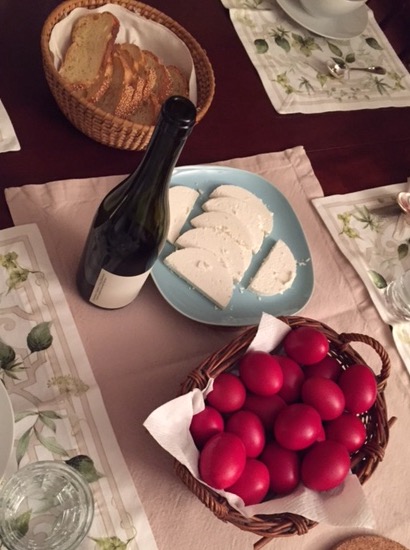
Easter preparations begin on Holy Thursday when the traditional Easter bread, τσουρέκι (tsoureki), is baked. Tsoureki is like a brioche or challah bread in the shape of a plait and is eaten all year round. Some people also bake Πασχαλινά κουλουράκια (pashalina koulourakia – Easter cookies). Eggs are dyed red, to symbolize the color of life and the blood of Christ) and sometimes they are incorporated for decoration in the tsoureki. In the evening, church services include the reading of the 12 Gospels.
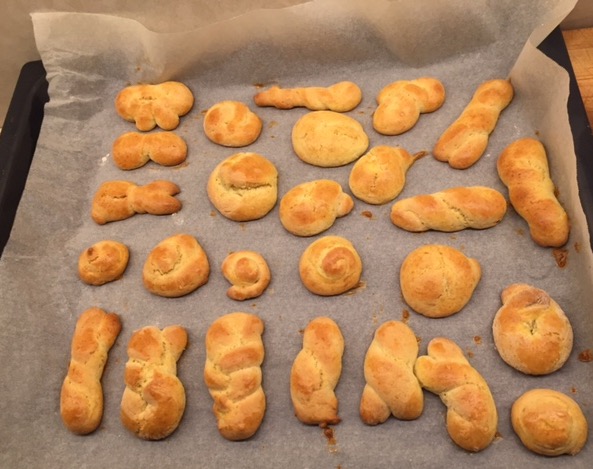
Holy Friday is a day or mourning. Traditionally, women and children take flowers to the church to decorate the symbolic bier of Christ, the Epitaphios. The Service of Lamentation mourns the death of Christ and the bier, lavishly adorned with flowers and bearing the image of Christ, is carried on the shoulders of the faithful in a procession through the community to the cemetery, and back. All the congregation follows, carrying candles and repeating the refrain of a beautiful Byzantine hymn. The candles on Holy Friday are yellow, made of natural beeswax.
On Holy Saturday, the Eternal Flame is brought to Greece by military jet from Jerusalem and is distributed to waiting priests who carry it to their local churches.
In the morning, preparations begin for next day’s Easter feast. Dishes that can be prepared in advance are made, and the traditional μαγειρίτσα (magiritsa) soup is prepared, which will be eaten after the midnight service, to break the Lenten fast.
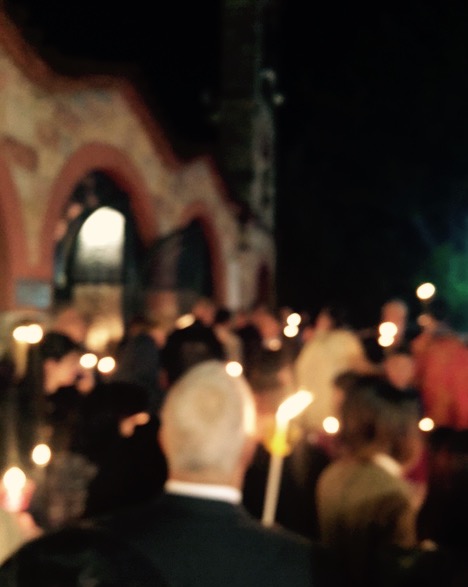
At night everyone, including children, attends the midnight Service of the Resurrection, each holding a white candle. Traditionally, children are given the candle by their godparents, and many are lavishly decorated. Churches fill to overflowing and most people gather outside where the service is broadcast by loudspeaker. Anticipation mounts; shortly before midnight, all lights are extinguished and churches are lit only by the Eternal Flame on the altar. When midnight sounds, the Priest calls out “Christos Anesti” (Christ is risen), and passes the flame, the light of the Resurrection, to those nearest him. The flame is then passed from person to person, and soon the church and courtyard are filled with flickering candlelight. The night air is filled with the singing of the Byzantine Chant “Christos Anesti,” and kisses and wishes are exchanged. The traditional exchange is ‘Χριστός Ανεστη’ (Christos Anesti – Christ is risen) answered by ‘Αληθώς Ανέστη’ (Alithos Anesti – He is truly risen). As is the custom, as soon as “Christos Anesti” is called out, church bells ring joyously non-stop, ships in ports all over Greece sound their horns, floodlights are lit on large buildings, and great and small displays of fireworks and noisemakers are set off. Cars passing by on the road also honk loudly.
People then carry the Eternal Flame home. The sight of hundreds of candle flames moving from churches to homes on that night is beautiful, indeed.
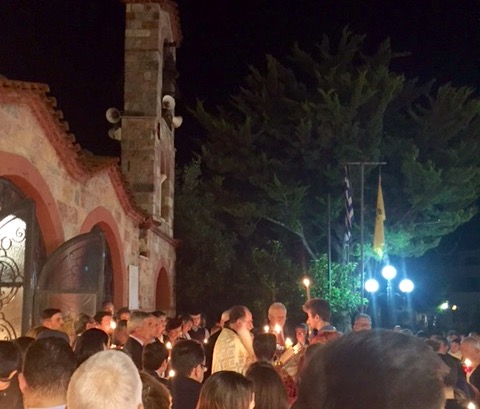
Once home, the flame from the candle is used to make the sign of the cross on the top of the door frame in smoke. The mark is left there throughout the year, to symbolize that the light of the Resurrection has blessed the home. The candles are then put on the table for the midnight meal. Everyone gathers around the table to break the fast; the feast includes magiritsa soup, tsoureki, and the red eggs. But before the eggs are eaten, there’s a traditional game to be played: ‘τσούγκρισμα’ (tsougrisma) – holding your egg, you tap the end against the end of your opponent’s egg, trying to crack it. It’s a game enjoyed by children and adults alike. Eggs are often dyed in large quantities since the game continues on the next day with more friends and family. In large gatherings, someone can usually be found cheating with a wooden egg!
At dawn on Easter Sunday, spits are set to work, since all over the countryside, the menu of the day is whole spit-roasted lamb or kid, to represent the Lamb of God. Also on the spit is another delicacy, kokoretsi, seasoned lamb or goat organ meat, wrapped in caul fat and then in yards of cleaned intestines. This recipe originated from the need to use up all parts of the lamb that was slaughtered for Easter, and not let any go to waste (the rest being used in the magiritsa soup). Delicious to many people in the Balkans, but definitely an acquired taste…Some people prefer lamb or kid dishes grilled or baked in the oven, according to various local recipes. With these come all the trimmings, like roast potatoes and salads, with ouzo, beer and wine flowing freely. Preparations for the meal turn into festive celebrations even before the eating begins. These gatherings of family and friends often last all day and sometimes long into the night.
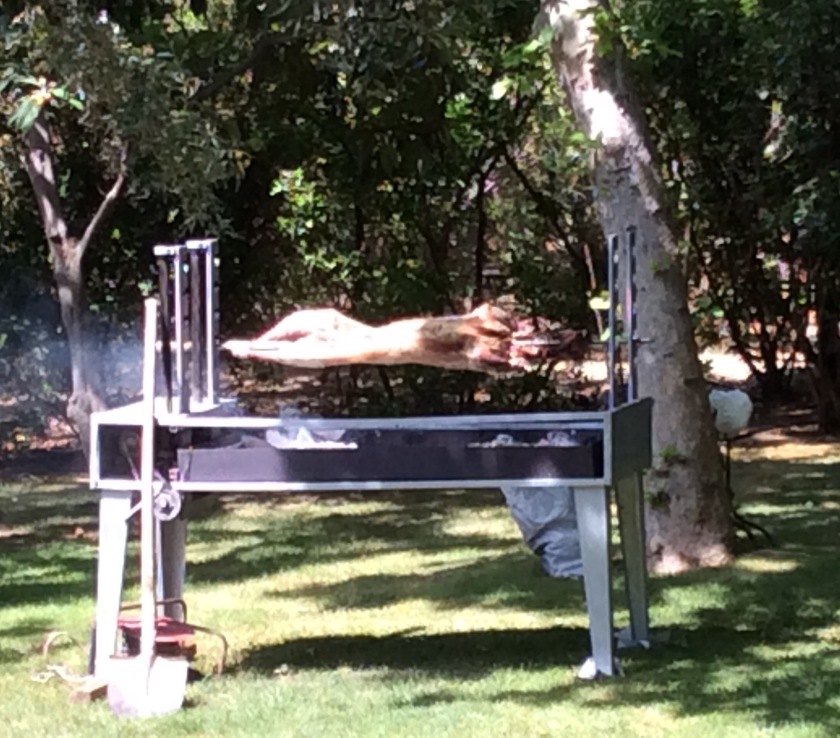
Many places in Greece have their own Easter traditions, such as the ‘rocket war’ of Chios, and special celebrations on Corfu, which are particularly impressive. Easter in Corfu is a huge festival, in which various components come together harmoniously: the Orthodox Christian faith, pagan traditions, the powerful presence of Saint Spiridon, the Roman Catholic community, the Venetian influence, genuine Corfiot humor, the music of the philharmonic bands and of course, the spring atmosphere.
And finally, although I doubt many of you will attempt it but – just for the fun of it – here’s a recipe on how to roast a whole lamb on the spit. Greek Easter is not ideal for vegans, nor for the faint-hearted!
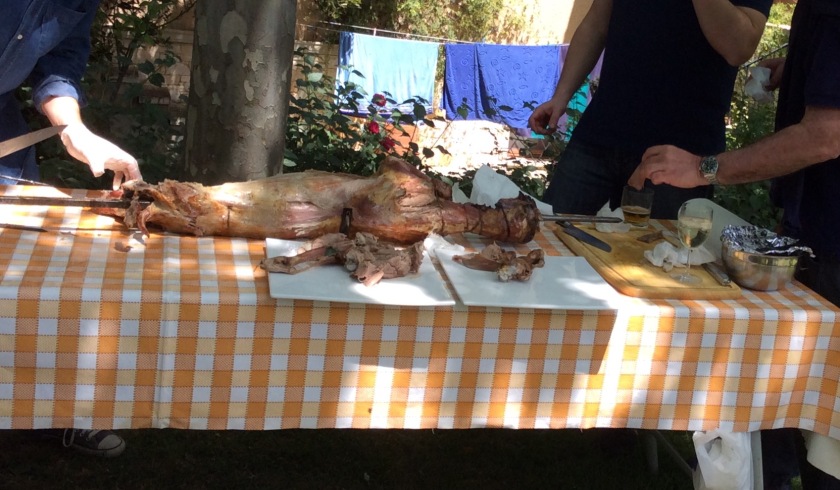


Dear Marina,
Happy Easter to you. Ilona and I have enjoyed numerous Easter celebrations while on Corfu in particular. Although Ilona is a strict vegetarian and I do not eat a lot of meat, so we passed on some of the food. We sure liked the Easter bread and cookies. You wrote this Easter blog beautifully. It was joyful to read. It made me miss Greece. We send you love.
Franklin and Ilona
LikeLiked by 1 person
Thank you both! 🌷
LikeLike
I loved reading this. I have been in Greece on several occasions when easter is celebrated, and it certainly is a very special time. I love how it is a truly religious festival, unlike in the uk where im sure most people are unaware of the reasons for celebrating Easter and it has become over commercialised. I would love to see the rocket wars on Chios, which I have read about.
LikeLiked by 1 person
Me too!
LikeLike
Been a while since I’ve dropped in my friend but what a wonderful post and cultural experience it was. Amazing country underneath the current woes. Really appreciate you sharing this and taking the time to showcase Greece and its customs. Thank you 😊
LikeLiked by 1 person
Glad you enjoyed it!
LikeLiked by 1 person
I always enjoy your posts….it’s just regrettable time prevents me from commenting more. Your culture ones really show off Greece in a most positive way…love it…
LikeLiked by 1 person
Thank you, Gary!
LikeLiked by 1 person
Hristos anesti! Hard to feel Easter-y here, where Easter has been over for so long… but thank you for reminding us of all the lovely traditions.
LikeLiked by 1 person
What a beautiful celebration! I love this post. The food sounds and no doubt tastes divine! Some elements reminded me of Novruz, spring festival in Azerbaijan.
LikeLiked by 1 person
Kali Anastasi Marina! Lovely post with our lovely meaningful celebration of Greek Easter. xx
LikeLiked by 1 person
Happy Easter! I love the idea of an eternal flame, shared amongst a community from a single point. What a wonderful way to express togetherness.
LikeLiked by 1 person
Festivals are so much more fun when they retain their original meaning. Here in New Zealand many see Easter as the holiday weekend when you eat hot cross buns and chocolate eggs. Plus it occurs at the start of autumn, rather than spring, so there’s not the same sense of life and rebirth.
LikeLiked by 1 person
Wow this is just lovely Marina! The traditions you have shown us are so special! The food looks fabulous and the history is also very informative. A wonderful post!
LikeLiked by 1 person
I’m hungry after that lot. Blimey the whole roasted lamb looks magnificent. Interesting how the traditions work too.
LikeLiked by 1 person
For a lot of people, the best bit is the head! But I draw the line personally:-)
LikeLiked by 1 person
Not tried it but I’m always game fir a new culinary experience.
LikeLike
OHHHH! I was in a Greek restaurant the other day and could not figure out why Easter was being so promoted in there. Now I get it. Thank you! 🙂 And Happy Easter!
LikeLiked by 1 person
Vnice didnt know how rhe date was established
LikeLiked by 1 person
Happy Easter to you! This is a lovely informative post that brings back wonderful memories of Easter in Corfu when a local family asked us to join the in celebrations. After the church service, unlike any I’d ever attended, the whole village walked after the priest as every house was blessed, lights borne high. Spine tingling occasion, wondrous, magical, ethereal. Then the partying began..!
LikeLiked by 1 person
Thank you so much for sharing your Easter with us, Marina. I read your post over at Solveig’s blog and reblogged it. I have always been fascinated by different cultural festivals etc around the world and the way you honour Easter shows so much respect. I really admire that.
I have been saddened to see that 2 Orthodox Greek Churches have burned down related to these celebrations. One was in Sydney and the other I think in New York. How awful.
A Happy & Blessed Easter to you!
xx Rowena
LikeLiked by 1 person
Thank you!
LikeLike
So interesting ~ thanks for sharing! In the U.S. Easter eggs are usually dyed pastel colors. I suppose that seems spring-like, but the red eggs are gorgeous! I hope you had a Happy Easter!
LikeLiked by 1 person
We did, thanks! Family time🐣
LikeLiked by 1 person
Thanks for sharing. ‘Orthodox Easter’ or ‘Greek Easter’ as we used to call it is quite an event in Melbourne as we have a large Greek population. To be invited to the feasting with Greek mates is an honour here. Happy Easter!
LikeLiked by 1 person
Although there are lots of differences in the way Easter is celebrated, the Easter greeting is more or less the same. Here we say “He is risen” and the response is “He is risen indeed. Alleluia”.
It was very interesting to read about all the customs and the food.
LikeLiked by 1 person
Ooooh how interesting. I wish I could go to Greece at Easter!
LikeLiked by 1 person
Nice blog, Marina. Filia!
LikeLike
Thanks! Your dear sister didn’t tell me you had one, too! Am hopping over now. X
LikeLike
very interesting. Made me hungry though too, I miss the Greek cuisine so much. Would definitely return someday.
LikeLiked by 1 person
You must!
LikeLiked by 1 person
Reblogged this on Letters from Athens and commented:
Tomorrow is Greek Easter. This usually entails large and joyous gatherings of family and friends, which of course this year are prohibited. Easter is the most important religious holiday of the year in Greece, so here is a reblog of a post I wrote a few years ago, describing the traditions of a normal year.
LikeLike